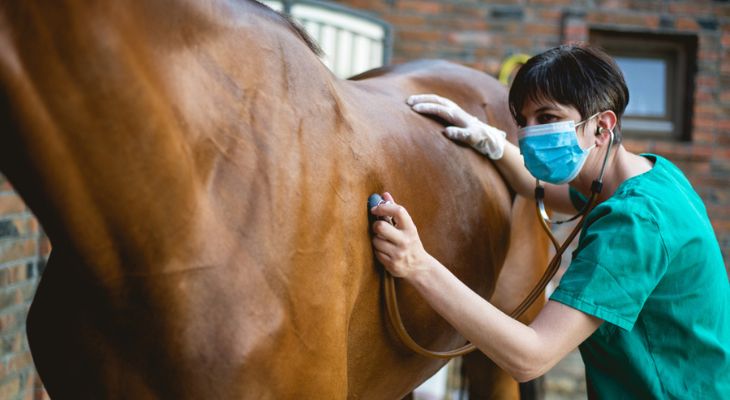The Importance of Pre-purchase Exams
- Created in Newsletter Library

Pre-Purchase Exams: Should You Request One Before You Buy Your Next Horse?
Pre-purchase exam aren't just a good idea if you're buying an expensive racehorse. The exams can help you ensure that the horse you want to purchase is in good health and doesn't have any hidden issues that could affect its performance.
What's Involved in a Pre-Purchase Exam
Selecting an equine veterinarian is one of the most important aspects of the pre-purchase exam. Obviously, you want to choose a veterinarian who doesn't have any ties to the owner to ensure that you receive an accurate assessment. If you're buying a horse for a specific purpose, such as breeding or racing, it helps to work with a veterinarian who has experience caring for those horses.
Before the exam begins, the veterinarian will take a look at the horse's medical history, including medications and previous surgeries. Reviewing the medical history makes it easier to spot ongoing health concerns or minor problems that may have been neglected.
During a pre-purchase exam, your veterinarian listens to the horse's heart and lungs, looks for signs of injuries, examines the hooves and shoes carefully, feels the abdomen and legs, and examines every part of the horse from head to tail. He or she also evaluates the way the horse eats, drinks and stands, walks, trots and canters on various surfaces.
Overall body condition and weight is also noted during the exam, as are the horse's teeth. Your veterinarian will also look for scars that could mean that your horse had a bout of colic in the past or a surgery that didn't appear on the medical records. Taking a look inside the horse's mouth confirms it's age and exposes signs of dental disease.
Tests Provide Valuable Information
Specialized exams and tests can be helpful if you're buying the horse for a specific purpose. For example, a blood test can reveal if the owner is giving a racehorse or trail horse medication to dull pain.
If you plan to breed a mare, The Horse recommends a breeding soundness exam that includes an assessment of cervical tone and competency, the vulva's external conformation, and an ultrasound to assess the cervix, uterus and ovaries. An evaluation of a stallion's semen will give you an idea of the horse's breeding capabilities.
A flexion test is also a good idea, according to the Practical Horseman. After manually bending a joint in the horse's leg, the veterinarian holds the leg in place briefly, then watches the horse trot. This test can reveal signs of lameness that may not be readily apparent. Should there be any question about the health of a particular joint, a digital X-ray can determine the severity of the problem. Many owners opt for an pre-purchase exam package that includes X-rays of the feet, hocks and fetlocks for extra piece of mind.
Other tests, including tests for genetic conditions, may also be recommended depending on the results of the examination. It's a good idea to set aside a few hours to accompany the equine veterinarian to the examination. If you're present, it's much easier to ask the veterinarian and the seller questions and see for yourself how the horse responds to the exam.
Like people, horses often have a few health conditions or issues that will be discovered during an exam. Although minor problems probably won't affect your decision, you may want to reconsider the purchase if the equine veterinarian discovers that the horse is lame, unhealthy or in poor condition.
Do you need to schedule a pre-purchase exam for a horse you're considering buying? Give us a call and we'll arrange an appointment time that's convenient for you and the seller.
Sources:
Practical Horseman: Pre-Purchase Exam Essentials, 1/2/2019
The Horse: The Buyer’s Guide to Prepurchase Exams, 8/25/2021


